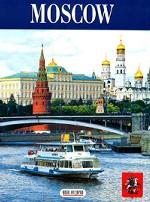

Дата отгрузки на данный момент неизвестна.
Товар закончился у основного поставщика, и, после получения заказа от вас, мы закажем его у других поставщиков. Мы не можем гарантировать выполнение данного заказа, поэтому настоятельно не рекомендуем заказывать данный товар, используя предоплату (банковский перевод и т.п.). Заказ на такой товар действителен в течение 3 недель (если в течение 3 недель товар не придет, заказ будет отменен). Однако, это не означает, что товар нельзя заказать вновь, поскольку в некоторых случаях возможны и более поздние поставки.
Технические характеристики
For centuries Moscow has been a treasure house of carefully preserved national tradition. All the Russian tsars and emperors were crowned here in Russia`s main cathedral, the ancient Dormition Cathedral, and both Peter the Great and Catherine the Great came to Moscow to celebrate their military victories. In 1812 the city was a sacrifice on the altar of the war, yet precipitated the inglorious demise of Napoleon`s great army. In May 1945 it greeted the victorious Russian troops coming back from Germany. Moscow has changed greatly! You`ll see other sights, different from those of the past. Still there is something eternal and everlasting in its look. History is alive in it and we can`t forget it.
Tradition says that in the 9th century Prince Oleg founded a town on the River Smorodinka (now the Moscow River). Excavations in the Kremlin have testified to the fact that a settlement existed on the site in the ancient time. In the 12th century there were some villages owned by a boyar Kuchka. Arabian coins from the 9th century found in the former market place prove that, even before that, there had been a settlement here, at the intersection of trading routes connecting the north and the south. Some scholars consider the name of Moscow a derivation from the language of the Meri tribe. In this dead language the word group "moskh akva" means "a bear". There are, however, other interpretations of the name. Moscow was first mentioned in chronicles in 1147, although archaeological evidence shows that a Slav settlement has existed on the site since the 6th century. Yury Dolgoruky is considered Moscow`s founder. In 1156 he built the first fortifications - ditches and earthen ramparts topped by a wooden wall. That was the Kremlin. In 1237 Moscow shared the fate of other Russian towns. Like all the towns of the Vladimir-Suzdal principality it was captured and burnt by the Mongols. In 1326 the Metropolitan of the Russian Orthodox Church transferred his seat from Vladimir to Moscow. In the 13th century Moscow grew in importance, in the 14th century became the capital of the principality and in the second half of the 15th century the capital of the united Russian state.